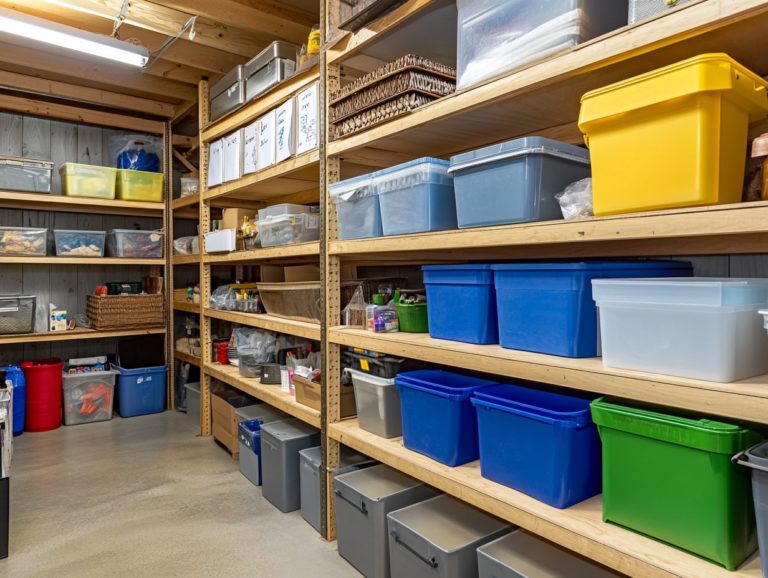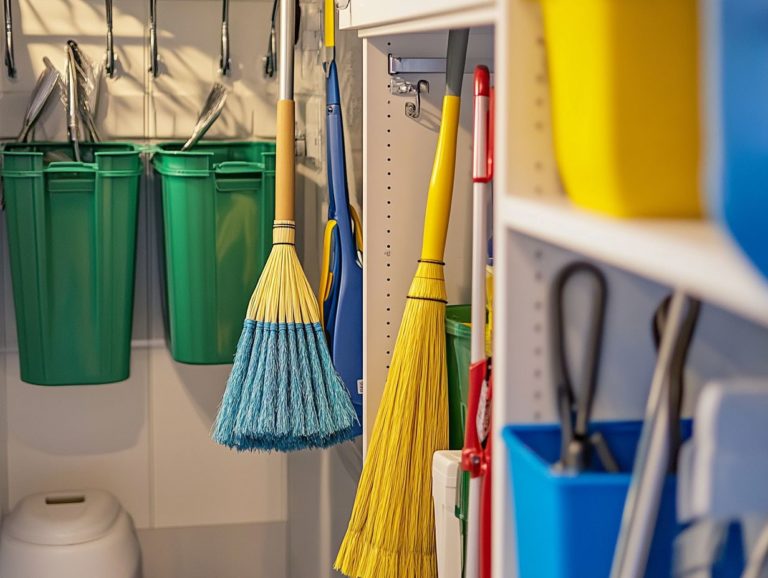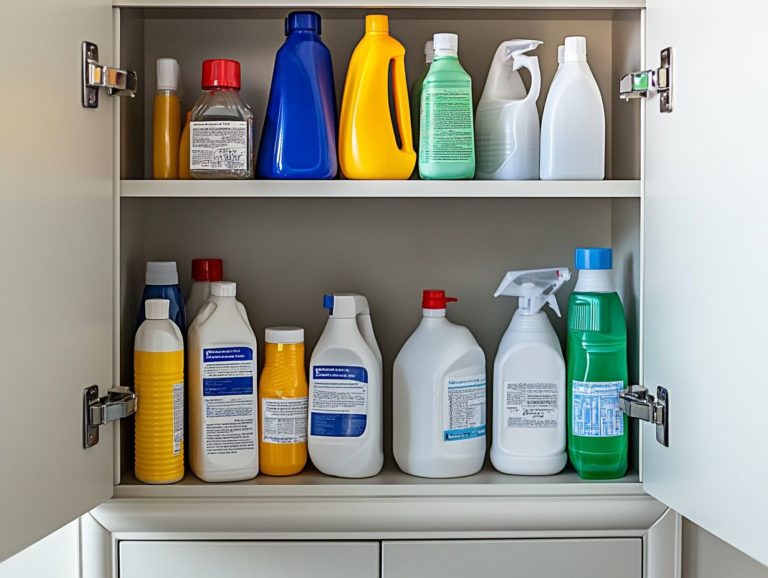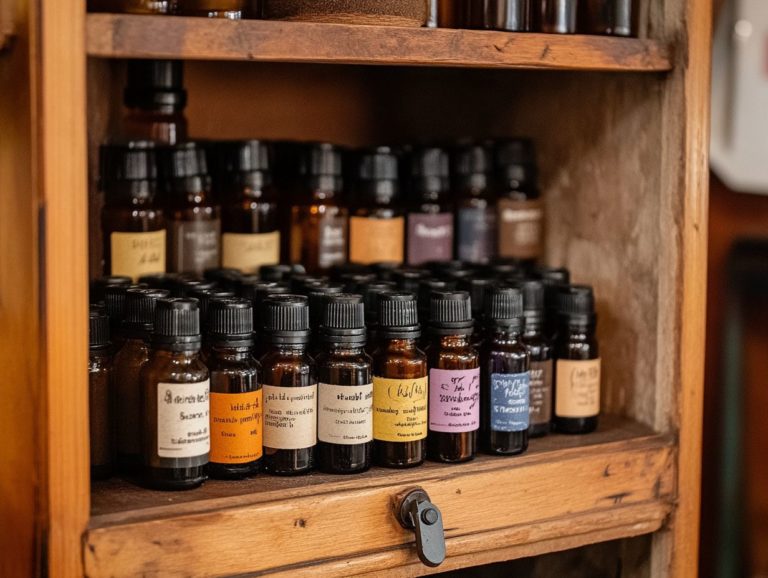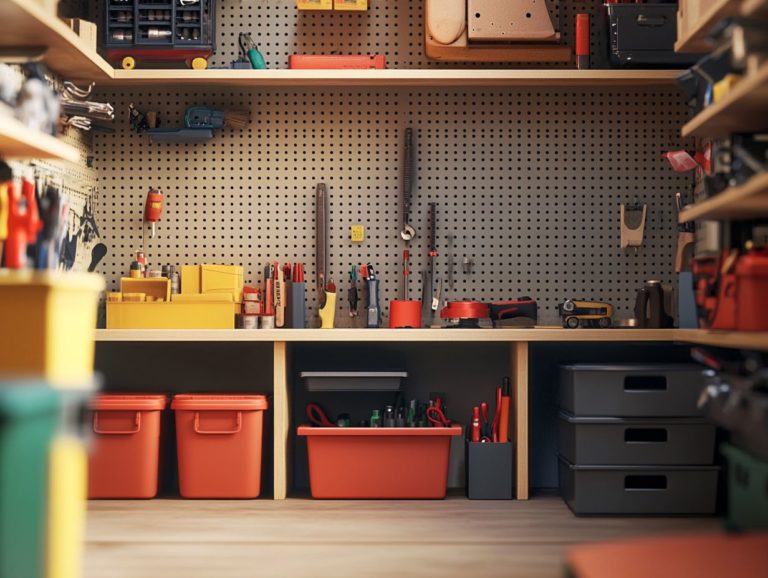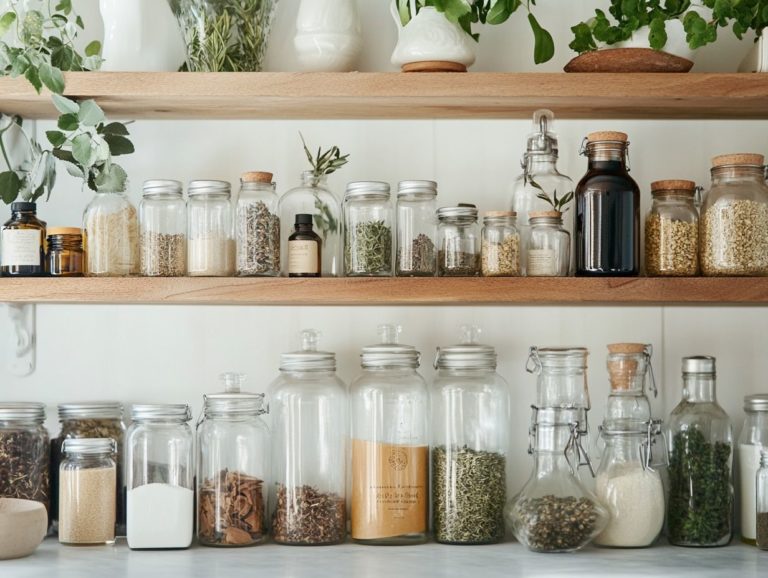How to Protect Cleaning Supplies from Pets
Maintaining a pristine home is crucial, but it s equally vital to ensure your furry companions are shielded from potentially harmful cleaning products, especially if you have pets like dogs.
Many everyday household products like bleach, ammonia, various disinfectants, and other cleaning supplies can pose serious risks to pets if ingested or inhaled.
This article delves into the cleaning supplies you should be wary of, offers guidance on how to store them safely, and outlines the steps to take in case of accidental exposure to harmful chemicals.
With the right precautions in place, protecting your pet while keeping your space tidy and free from toxic chemicals is not only achievable but also surprisingly straightforward.
Contents
- Key Takeaways:
- What are the Common Household Cleaning Supplies that are Harmful to Pets?
- How Can You Protect Your Cleaning Supplies from Pets?
- What to do if your Pet Accidentally Ingests Cleaning Supplies?
- How to Prevent Accidents with Cleaning Supplies and Pets?
- Frequently Asked Questions
- How can I keep my cleaning supplies safe from my curious pets?
- What should I do if my pet accidentally ingests cleaning supplies?
- Are there any pet-safe cleaning supplies available?
- How can I prevent my pets from knocking over cleaning supplies?
- What should I do if my pet gets cleaning products on their fur or paws?
- Is it safe to use essential oils around pets?
Key Takeaways:
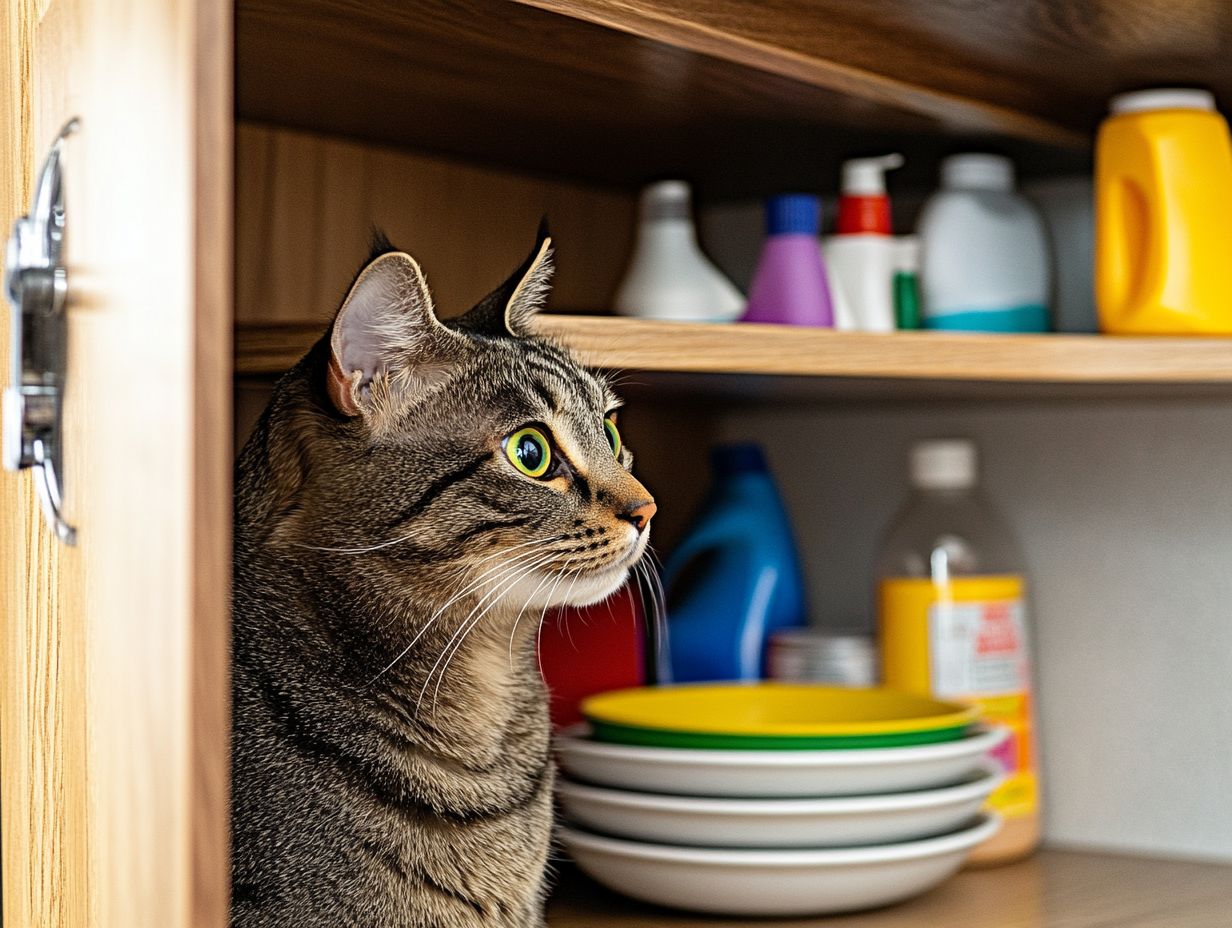
What are the Common Household Cleaning Supplies that are Harmful to Pets?
As a responsible pet owner, it’s vital to know that some common cleaning supplies lurking in your cabinets can be harmful to your beloved pets. While products like bleach, ammonia, and various disinfectants effectively banish germs and keep your home spotless, they can also pose serious health risks to your furry friends, especially dogs.
You can prevent accidents that could lead to distress or even a trip to the veterinarian, possibly covered by pet insurance like PDSA Pet Insurance, by understanding which cleaning supplies are toxic to pets and seeking out safer, pet-safe alternatives that won t compromise their well-being.
1. Bleach
Bleach is a common household cleaner often relied upon for disinfecting surfaces, but it poses a serious threat to your pets, particularly dogs. Ingesting or inhaling bleach can lead to severe respiratory and gastrointestinal symptoms (which affect their stomach and intestines), including nausea, vomiting, and difficulty breathing, which can harm their health.
Stay alert your pet’s health depends on it! Even small amounts of bleach can have harmful effects, leading to visits to the veterinarian. Exposure can cause skin irritation and burns, complicating your pet s overall health.
You can also find safer, pet-safe alternatives that are just as effective for cleaning. For instance, vinegar serves as a natural disinfectant and deodorizer, while baking soda can effectively tackle odors and stains. Lemon juice is another natural alternative that helps disinfect surfaces.
By opting for these safer cleaning solutions, you can keep your home environment pristine without compromising the health of your beloved furry companions.
2. Ammonia
Ammonia is one cleaning product you might want to keep at arm’s length its strong fumes can be quite a menace to pets, particularly dogs. Just imagine the irritation it can cause their respiratory systems, with symptoms ranging from a simple cough to much more serious health concerns.
If your pet has existing health issues like asthma or allergies, exposure to ammonia can worsen their condition, making them more susceptible to severe respiratory distress. This chemical s corrosive nature can lead to skin irritation or even chemical burns if it comes into contact with your furry friend’s fur or paws.
For those of you seeking safer alternatives, you ll be relieved to discover a plethora of options available. Cleaners made from vinegar, baking soda, citric acid, and essential oils can effectively tackle dirt and grime without the health risks associated with harsher chemicals. By opting for these pet-friendly solutions, you not only maintain a spotless home but also create a much safer environment for your beloved companions.
3. Disinfectants
Keep your pets safe by choosing the right cleaning products! Many household disinfectants contain harmful chemicals that pose significant risks to your pets. Exposure to these products can lead to serious health concerns that may necessitate a visit to the veterinarian or the Pet Poison Helpline.
Common ingredients like bleach, phenols, and quaternary ammonium compounds are particularly toxic to pets. These can result in distressing symptoms such as drooling, vomiting, and respiratory issues. It is essential for you, as a pet owner, to keep a vigilant eye on your animals after using these products. Familiarize yourself with the signs of exposure.
Before choosing any cleaning agent, be sure to consult the instructions. Some disinfectants can remain hazardous even after they seem dry.
Fortunately, you have pet-safe alternatives at your disposal, including:
- Vinegar: a natural disinfectant that kills germs without harming pets.
- Baking soda: neutralizes odors and cleans surfaces safely.
- Essential oil-based cleaners: select pet-safe ones that are non-toxic.
These alternatives can help create a safer environment for both your pets and your human family members. Act now to protect your furry friends!
4. Toilet Bowl Cleaners
Toilet bowl cleaners are often underestimated, yet they can pose significant risks to your pets. Many of these products contain harsh chemicals that are toxic if ingested and can also be harmful upon contact.
Typically, these cleaners are laced with bleach, ammonia, and other strong chemicals. This can lead to serious health issues for your furry companions, potentially requiring emergency care. Should your pet accidentally ingest or even lick these substances, they might experience stomach upset, respiratory problems, or skin irritation.
Watch for symptoms of poisoning, such as vomiting, excessive drooling, or lethargy. Vigilance is essential for pet owners.
To maintain a clean bathroom while safeguarding your pets, consider using alternatives like vinegar and baking soda. These natural options can effectively clean toilets while posing a lower risk to your beloved animals.
Enzyme-based cleaners are another excellent choice. They keep your bathroom fresh without the hazardous side effects linked to traditional toilet bowl cleaners. Take action today to protect your pets!
5. Dish Detergents
While dish detergents are essential for maintaining the cleanliness of your dishes, it’s crucial to be aware that some brands can pose risks to your pets. Many contain chemicals that may cause stomach upset if ingested, and we all know how curious pets can be about their surroundings.
Remember, the dangers of certain detergents go beyond just ingestion. Skin exposure can lead to irritation or even allergic reactions, affecting your pet’s overall health.
To protect your furry family members, it s vital to select pet-friendly alternatives made with natural, non-toxic ingredients like essential oils and plant-based cleaners. These options not only ensure your dishes shine but also safeguard the health of your beloved pets.
Implementing safe storage practices is equally important. Keeping cleaning supplies on higher shelves or securely locked away can prevent accidental access. Create a safe haven for all the members of your household!
6. Carpet Cleaners
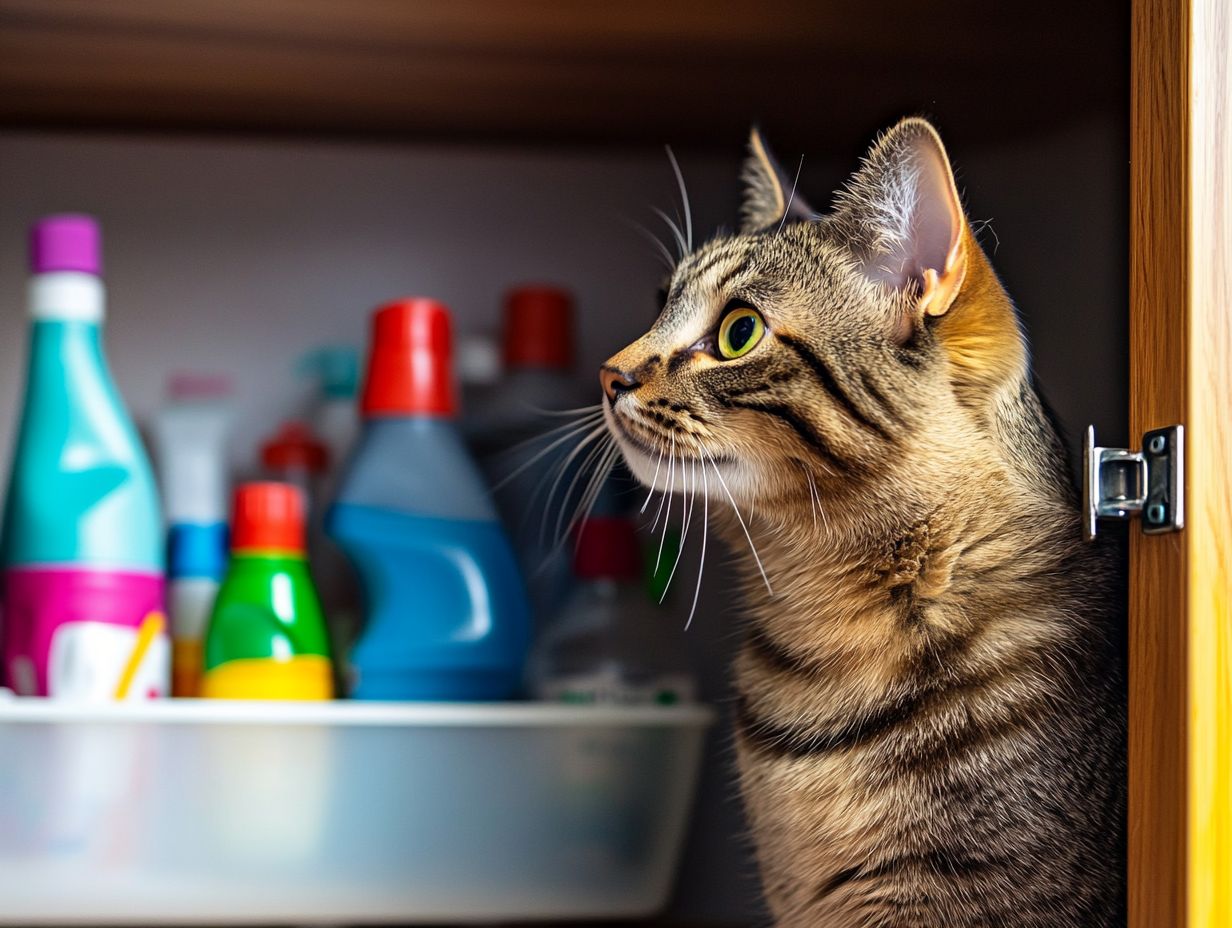
Carpet cleaners often contain strong chemicals that can be irritating and harmful to your pets. It s essential for you to consider safer, non-toxic cleaning options for your carpets.
These harsh substances release fumes and residues that can trigger allergic reactions, skin irritations, respiratory issues, and other health risks in your furry friends.
As a pet owner, it’s crucial to remain vigilant since pets frequently come into contact with freshly cleaned carpets. Exploring natural cleaning alternatives like vinegar, baking soda, lemon juice, or plant-based cleaners can effectively tackle dirt and odors without jeopardizing your pets’ health.
Make sure to keep your pets away from freshly cleaned areas until they are completely dry. This will help avoid accidental exposure to cleaning products. Taking these precautions will create a safe and inviting environment for your beloved companions while keeping your home free from toxins.
How Can You Protect Your Cleaning Supplies from Pets?
To ensure the safety of your pets from harmful cleaning supplies, it’s essential to adopt protective measures that keep these products securely stored and out of their reach. By placing cleaning supplies in a safe location and using safety locks for cabinets, you can dramatically reduce the risk of accidental exposure to toxic chemicals and ensure the safety of your pets!
Choosing pet-friendly cleaning products enhances the protection of your beloved companions from potential health hazards while allowing you to maintain a pristine household environment.
1. Store Cleaning Supplies in a Safe Place
For pet owners, storing cleaning supplies in a safe place is essential to prevent accidents and protect their furry companions from exposure to harmful chemicals that could jeopardize their health.
Consider using cabinets with child-proof locks; this is a reliable way to keep dangerous products out of curious paws. Placing these items on high shelves can further deter pets from reaching them.
Clear bins with labels will help you stay organized and provide easy access when needed. Follow the instructions on all cleaning products to ensure proper use and storage.
You might also think about mounting magnetic strips on walls to securely hold spray bottles this keeps them visible yet inaccessible to your pets. Implement these safety tips to prevent accidental spills and ingestion.
A dedicated storage room with a securely closing door can offer you peace of mind, creating a hazard-free environment for your beloved companions and reducing health risks. Start today by securing your cleaning supplies and creating a safer home!
2. Use Childproof Latches
Putting childproof locks on cabinets where you store cleaning supplies is an effective way to enhance safety and prevent your pets from accessing harmful products like bleach and ammonia.
These locks serve as a crucial barrier, ensuring that your curious pets cannot open cabinets and reach toxic substances. The installation process is straightforward, requiring minimal tools and time, making it accessible for any pet owner eager to secure their home.
Investing just a bit of effort into this preventive measure allows you to enjoy significant peace of mind, knowing that your furry companions are less likely to encounter hazardous materials. Safety locks not only protect your pets but also offer a safety net for inquisitive children, creating a safer environment for everyone in your household.
3. Keep Cleaning Products Out of Reach
Keeping cleaning products out of reach is crucial for you as a pet owner, ensuring that your furry companions don’t accidentally ingest or come into contact with harmful chemicals or toxins.
By using high storage solutions, such as cabinets positioned above counter height or hooks on the walls for smaller items, you can significantly reduce the risk of an unfortunate incident. It’s also important to organize all cleaning products in a designated area, ensuring you don t mix them with everyday items like food or toys.
Investing in childproof locks for cabinets adds an extra layer of safety, making it challenging for your curious pets to access these potentially dangerous materials. Regularly review and purge old products to maintain a safe environment for your beloved pets and minimize the risk of exposure to toxins.
4. Use Pet-Friendly Cleaning Products
Choosing pet-friendly cleaning products is an essential strategy for you as a pet owner who wants to maintain a pristine household while keeping your beloved animals safe from harmful chemicals and toxins.
By selecting these alternatives, you not only protect your furry companions from potential health risks but also enhance the overall quality of your indoor environment. Take vinegar, baking soda, and lemon juice, for example; these common household items effectively tackle odors and stains, making them perfect for cleaning the areas your pets frequent.
You might also consider essential oils like lavender and lemon to freshen up your space, but be sure to use them cautiously and in the right dilutions to keep your pets safe. Embrace these natural cleaning solutions to significantly reduce the risk of allergies and respiratory or gastrointestinal issues in your animals, allowing them to thrive in a clean, toxin-free home!
What to do if your Pet Accidentally Ingests Cleaning Supplies?
If your pet accidentally consumes cleaning supplies, act quickly to reduce any harm. Monitor your pet for signs of distress like vomiting or lethargy. Call the Pet Poison Helpline right away.
If you notice concerning symptoms, contact your veterinarian immediately. They can guide you on the best steps to take, such as inducing vomiting or seeking emergency care.
1. Observe your Pet’s Behavior
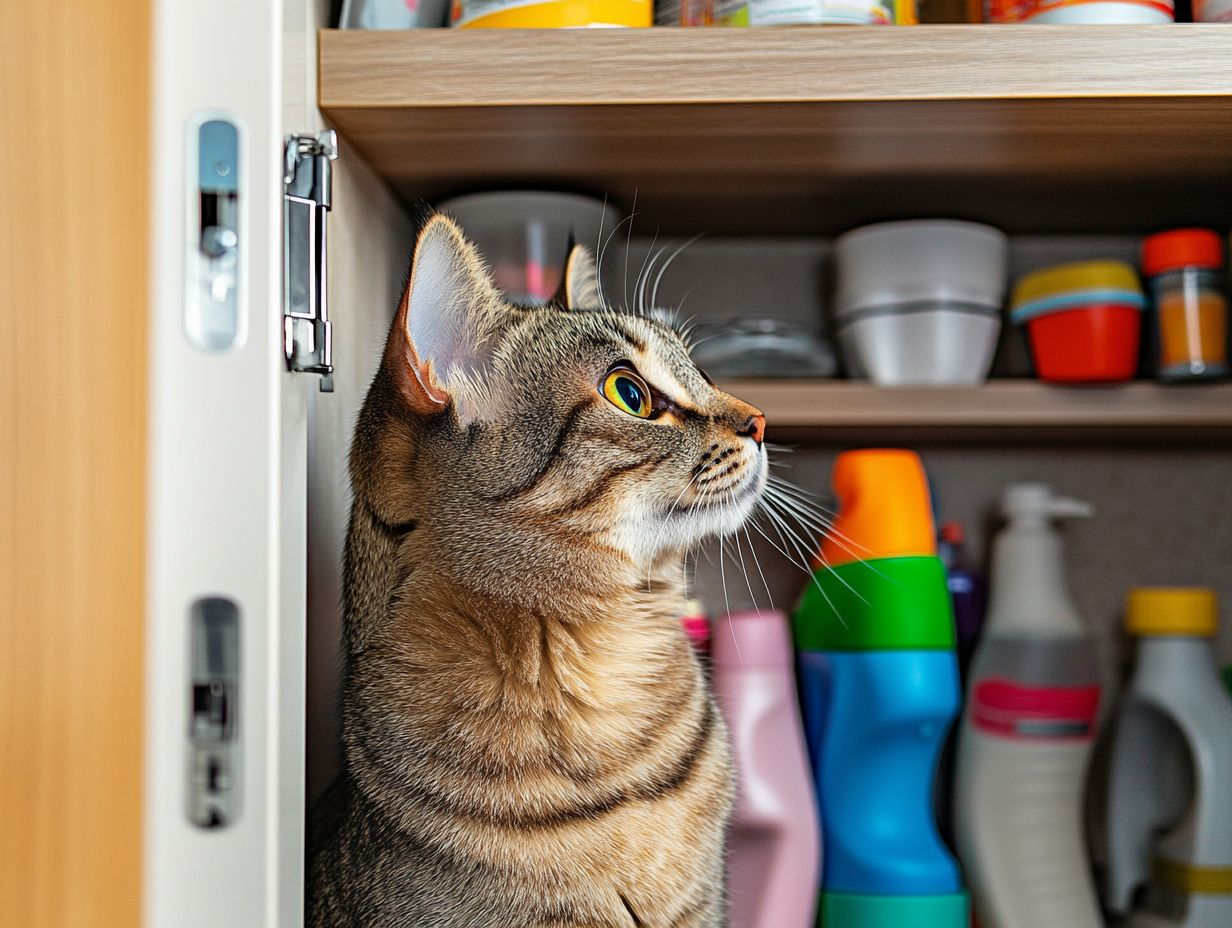
Watching your pet after exposure to cleaning supplies is crucial. Look for symptoms like drooling or gastrointestinal distress.
Be alert for excessive drooling or difficulty breathing. These may indicate a serious reaction that requires urgent attention. Your pet might also show unusual behaviors like lethargy or restlessness.
If you notice any of these symptoms, timely observation and prompt communication with a veterinarian can be lifesaving. By understanding your pet’s condition, you can act swiftly to ensure they receive the necessary care.
Consider discussing pet-safe disinfectants with your vet for regular household use.
2. Contact your Veterinarian
If you suspect ingestion, contact your veterinarian immediately. Provide them with details about the cleaning product, including type, quantity, and symptoms.
Your prompt action can significantly improve treatment outcomes. Your quick response could save your pet’s life and alleviate the stress of the situation.
3. Induce Vomiting
Your veterinarian may recommend inducing vomiting in certain situations to remove harmful substances. This means making your pet throw up to expel what they ingested. However, this should only be done under their guidance.
Inducing vomiting is not safe without professional advice. Always consult a veterinarian to ensure your pet s safety and well-being.
To prevent such incidents, consider pet-proofing your cleaning supplies, ensuring they are out of reach of your furry companions.
4. Seek Emergency Care
If your pet is showing severe symptoms or has ingested a large amount of cleaning supplies, seeking emergency care is essential for their well-being. Veterinary professionals manage these crises with both efficiency and compassion.
Upon arrival, the staff will assess the situation and document any symptoms your pet may have, such as vomiting, lethargy, or other signs of distress. Be prepared for tests or evaluations that may include blood work or imaging to determine the extent of the ingestion. Treatment options can vary; they may induce vomiting if the ingestion was recent or give activated charcoal, a substance that helps absorb poisons. In more serious cases, fluids given through a needle and supportive care may be necessary to aid your pet’s recovery.
Knowing which cleaning supplies were ingested will greatly assist the veterinary team in creating the most effective treatment plan for your beloved companion.
How to Prevent Accidents with Cleaning Supplies and Pets?
Preventing accidents involving cleaning supplies and pets requires your care and effective safety measures to protect your companions from harmful substances. Establish a routine cleaning schedule that includes secure storage of cleaning supplies and keeping pets away from cleaning areas. This significantly reduces the risk of mishaps. Use natural products like pet-safe vinegar and baking soda for your cleaning.
Using pet gates or crates during cleaning adds extra protection, creating a safe environment for both your pets and yourself while keeping your household pristine.
Consider pet insurance now to safeguard against unexpected vet bills!
1. Clean Up Spills Immediately
Act quickly to clean up spills! Cleaning them promptly is a crucial safety measure for pet owners, helping to prevent your beloved companions from coming into contact with potentially harmful cleaning supplies. This includes common household cleaners that may contain bleach or ammonia.
Addressing spills quickly protects your furry friends and maintains a pristine living environment. To effectively handle these inevitable accidents, have a well-stocked spill kit ready. This kit should include:
- Absorbent cloths
- A scoop for easy cleanup
- A safe cleaning solution tailored to the specific type of spill
Once you ve ensured the area is safe, keep your pets out of the vicinity until the cleaning process is fully completed. This proactive approach minimizes risks and guarantees a safer, healthier home for both you and your pets.
2. Keep Pets out of the Cleaning Area
To keep your pets safe during cleaning, it s crucial to keep them out of the cleaning area, thereby minimizing the risk of accidental exposure to harmful cleaning supplies or disinfectants.
You can achieve this by using barriers, such as baby gates or closed doors, to restrict access to the areas you’re tidying up. Providing distractions like engaging toys or tasty treats can keep your pets entertained while you focus on cleaning tasks.
Creating a safe space, perhaps with a cozy bed and familiar items, allows your pets to feel secure and comfortable as they wait for the cleaning session to wrap up. These strategies protect your beloved companions and help maintain a calm and serene cleaning environment.
3. Use Pet Gates, Crates, or Playpens
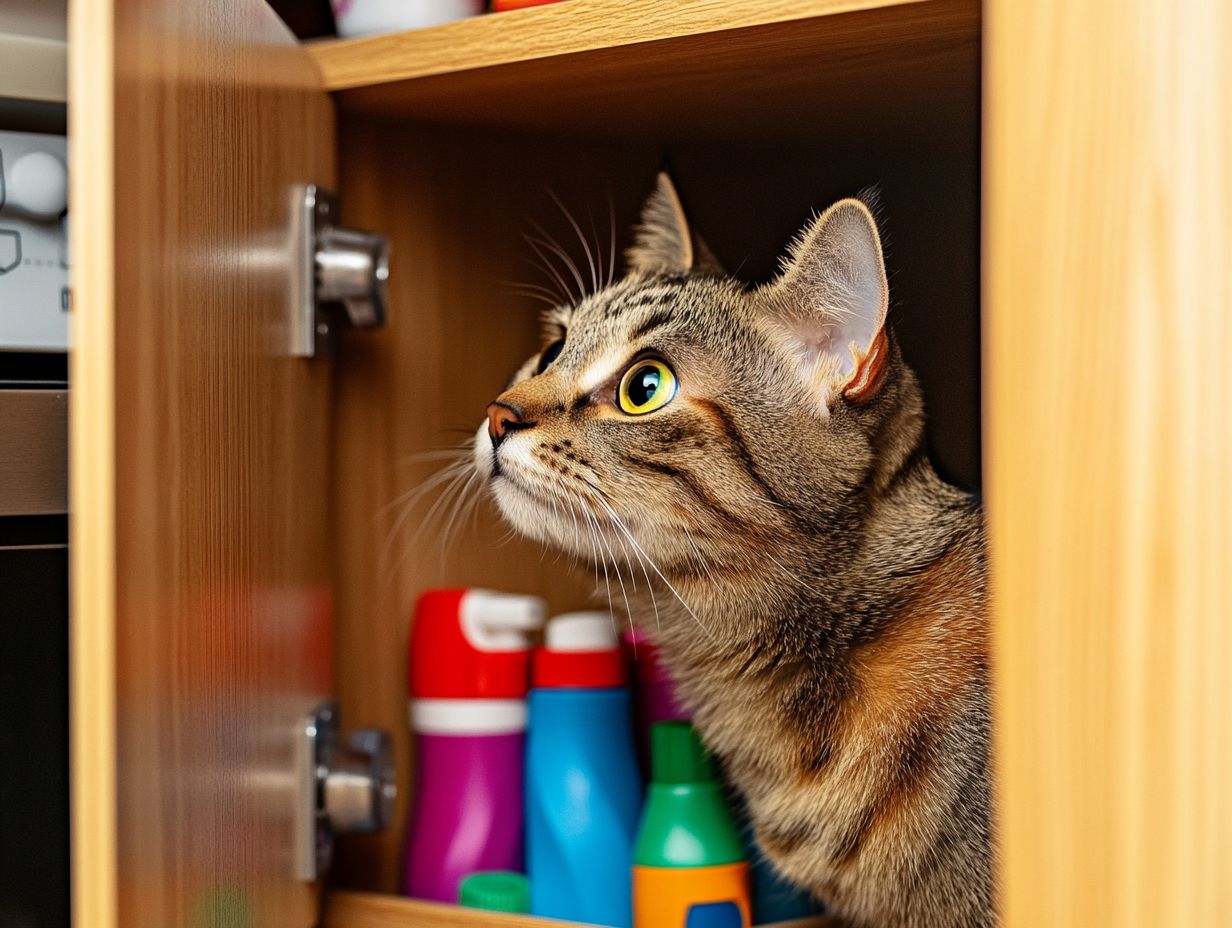
Utilizing pet gates or crates is a smart strategy for creating a safe haven for your pets during cleaning sessions. This effectively establishes a barrier between them and potentially hazardous cleaning supplies and household cleaners.
This simple step not only prevents accidental exposure to chemicals and other harmful cleaning supplies but also minimizes the chances of your pets getting underfoot while you maneuver around the house with brooms and vacuum cleaners.
As a pet owner, the peace of mind that comes from knowing your furry companions are safely contained allows for a more efficient and stress-free cleaning experience.
Choose a gate or crate considering its strength, ease of use, and how well it fits your pet’s size and behavior. A sturdy, adjustable gate can be particularly advantageous for versatile spaces, while a cozy crate provides a secure retreat for your pets to unwind amid the hustle and bustle. Make sure to read the manufacturer’s instructions to ensure proper use and safety.
4. Supervise your Pet during Cleaning Time
By keeping an eye on your pets, you protect them from hazards while creating a relaxing atmosphere for your home. Supervising your pet during cleaning time is an essential precaution to ensure they don t inadvertently encounter harmful cleaning supplies or chemicals, which can pose health risks to animals.
As a responsible pet owner, consider implementing strategies such as:
- Designating a pet-free zone while cleaning
- Using non-toxic and pet-safe cleaning products, like those made from natural ingredients such as vinegar or baking soda
- Ensuring thorough ventilation in any areas that have been cleaned to prevent respiratory issues
Keeping your pets in a separate room or using a crate can provide you with peace of mind. This allows you to focus on your cleaning tasks without the concern of curious paws getting into mischief. Regularly checking the area for any leftover materials will further enhance the safety of your environment. By taking these thoughtful precautions, you can maintain a pristine home while prioritizing the well-being of your beloved companions and safeguarding them against household cleaners.
Frequently Asked Questions
How can I keep my cleaning supplies safe from my curious pets?
There are a few ways to protect your cleaning supplies from pets. One option is to store them in a locked cabinet or high shelf that your pets cannot reach. Another option is to use child-proof latches on your cabinets to prevent your pets from opening them. Keeping these items safely away from pets helps prevent accidents and potential exposure to harmful substances.
What should I do if my pet accidentally ingests cleaning supplies?
If your pet ingests cleaning supplies, seek immediate veterinary care. Don t wait this is crucial! Even small amounts of certain chemicals can be harmful to pets. Contact your veterinarian or a pet poison control hotline such as the Pet Poison Helpline for guidance on how to proceed. Be aware of symptoms like gastrointestinal distress or respiratory issues, which need immediate attention.
Are there any pet-safe cleaning supplies available?
Yes, there are many pet-safe cleaning supplies on the market that are specifically formulated to be non-toxic and safe for pets. Look for products with natural ingredients like vinegar, baking soda, or lemon juice, and avoid harsh chemicals like bleach or ammonia. Using these safer alternatives can help reduce health risks for your pets.
How can I prevent my pets from knocking over cleaning supplies?
Pets can be quite curious and may knock over cleaning supplies in their quest to investigate. To prevent this, make sure to secure your cleaning supplies in a cabinet or use heavy, stable containers. You can also try using a pet gate to keep your pets out of the cleaning area, ensuring a safe environment for both your pets and household items.
What should I do if my pet gets cleaning products on their fur or paws?
Act quickly to wash off any cleaning products! Use mild soap and warm water to clean the area gently.
If your pet shows signs of irritation, like redness or swelling, contact your veterinarian right away.
Keep pet-safe cleaning products on hand to minimize potential harm.
Is it safe to use essential oils around pets?
Some essential oils can harm pets, especially cats. Always check if an essential oil is safe before using it around your furry friends.
For more information, consider consulting resources like the Pet Poison Helpline.

